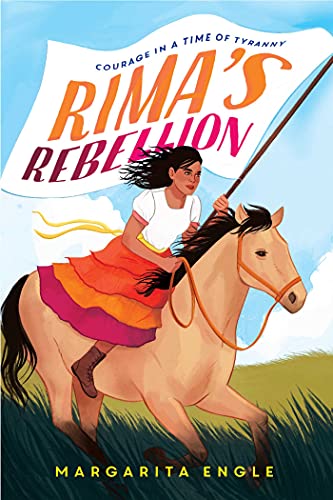Rima’s Rebellion: Courage in a Time of Tyranny
Rima is a “natural” child in Cuba in the early 20th century. Her father, a wealthy landowner, had an affair with one of his workers, and now Rima, her mother, and her grandmother live on his land with no rights of their own. Rima’s grandmother was one of the legendary mambisas, horseback-riding women revolutionaries during their country’s fight for independence against Spain. She is Rima’s inspiration as the teenager becomes a skilled rider and a witness to the struggle for women’s suffrage, democracy, the rights of natural children, and the rights of all women to be protected from the violence of husbands and fathers. Admitted to a program for apprentice printers run by a prominent feminist activist, Rima prints the poetry of poets and rebels and learns the value of her own voice.
The poems—snapshots of moments in this fictional character’s life—allow the author to span thirteen years and multiple themes seamlessly. Rima’s horse Ala (the name means “wing”) is both source and symbol of her strength as she grows into womanhood and seems to encounter more setbacks than successes in an unjust land ruled by a treacherous and merciless strongman. Despite the injustice of her situation, Rima discovers that being a natural child has benefits: Unlike her seemingly privileged half-sister whom she ultimately befriends, she has no father who can kill her if he disapproves of her choices. She learns—and so do readers—that the metaphors in poetry aren’t just for conveying beautiful images. They also serve as a language of resistance to censorship and repression: “Gardens in the poems are prisons. / Flowers in the verses / are revolutionaries.” Today when authoritarianism grows like weeds, Rima’s story is both inspiration and information for those who love freedom.










